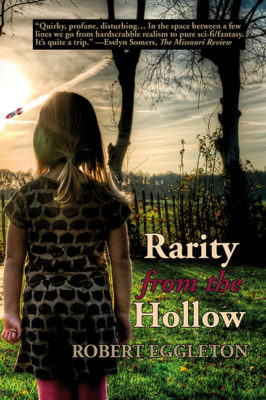Guest Post: Saving the Universe by Robert Eggleton
The following article discusses the evolving role of fictional heroes from the perspective of Lacy Dawn, the protagonist of Rarity from the Hollow, a double Gold Medal winning adult literary science fiction novel.
“Lacy Dawn is the last person you would pick to be the savior of the universe. She’s in the fifth grade in the backwoods of West Virginia. Her best friend – Faith, is the ghost of a school mate that was beaten to death and lives in a tree. During recess she gives advice to her schoolmates about their future. Her boyfriend – DotCom, is an android that has lived in a cave for thousands of years keeping watch over her lineage from the first days of humankind….” — The Baryon Review
Historically, our fictional heroes have been male, capable of violence, sometimes with a warm heart for at least one, usually scantily clad woman who was depicted on book covers. Of all genres, perhaps science fiction has been the most blatantly sexist. As a reader, the message was that only guys had the strength or fortitude to pull a trigger or push a button to blow up an enemy spaceship, or, for that matter, even speculate about such advanced technology on a level capable of writing about such future possibilities.
Of course, there is a huge difference between the historic underrepresentation of female science fiction authors and feminist science fiction. In today’s marketplace, the low odds of having one’s work discovered no longer appears to be gender dependent. The World Wide Web became available in 1993, Stephen King was the first major author to self-publish in 2000, and now there so many books are published each year that the successful marketing of one’s fiction may be more appropriately analyzed as related to economic class as opposed to the gender of the author. Today, five major conglomerate publishers spend a lot of money to promote what they believe will be books with strong profit margins. Indie authors, rich and poor of both all sexes, compete for attention at a much lower level.
Feminist science fiction refers to the creation of worlds and futures in which women are not bound by the norms of dominant cultures. While the roots of feminism in general and in science fiction are much deeper, in the U.S. the ‘60s was regarded as a beginning for a new wave of both. In 1963, The Feminine Mystique by Betty Friedman became a best seller by challenging the image of women in media. One early feminist science fiction novel was Left Hand of Darkness by Ursula K. Le Guinn which hit it big in 1969. A couple of decades later, The James Tiptree, Jr. Award began to recognize speculative works that prompted reflection on gender related constraints in the writing and appreciation of fiction.
Before you yell, “we’ve come a long way, baby!” consider a couple of what I consider to be setbacks. First, while strong female protagonists in science fiction may be more prevalent than ever before, a significant proportion have risen to hero status by writings which attributed them with traditional male characteristics – physical prowess, i.e. Zena: the Warrior Princess or Buffy the Vampire Slayer. Secondly, in 2013, a group referred to as the Sad Puppies invaded the science fiction community by an assault on the Hugo Awards, the most prestigious award in science fiction. It began as a demand that pulp fiction, as opposed to fiction which prompted reflection about life’s issues, regain its former status when making awards. Similar campaigns have continued. One prominent author recently asserted that science fiction is a purely male domain. The Mary Sue.com
Rarity from the Hollow, my debut novel, has been referred to as “unique” or a synonym by several book reviewers. One of the most prominent was by Awesome Indies and resulted in the award of a Gold Medal:
“…The author has managed to do what I would have thought impossible; taken serious subjects like poverty, ignorance, abuse, and written about them with tongue-in-cheek humor without trivializing them. In fact, the rustic humor and often graphic language employed by Lacy Dawn and her compatriots only serve to highlight their desperate lives, and their essential toughness and resilience….” Aawesome Indies.net
One of these book reviews that I personally liked the best was by a less prominent book reviewer who publicly disclosed in her review that she was a survivor of rape.
“…soon I found myself immersed in the bizarre world… weeping for the victim and standing up to the oppressor…solace and healing in the power of love, laughing at the often comical thoughts… marveling at ancient alien encounters… As a rape survivor… found myself relating easily to Lacy Dawn… style of writing which I would describe as beautifully honest. Rarity from the Hollow is different from anything I have ever read, and in today’s world of cookie-cutter cloned books, that’s pretty refreshing… whimsical and endearing world of Appalachian Science Fiction, taking you on a wild ride you won’t soon forget….” KylieJude.com
Other common techniques that some authors have used to create powerful female protagonist has been to combine intelligence with irresistible sex appeal or the use of sexuality as a weapon, sometimes represented in film and video games, i.e. the James Bonds. Some supporters of feminist fiction have objected. Mic.com
I believe that one reason that Rarity from the Hollow has been found by so many book reviewers to be unique concerns its female protagonist, Lacy Dawn. She’s a coming of age character millennia old, doesn’t have an ounce of sex appeal, skinny with brown stringy hair, doesn’t carry a sword or light saber, and is destined and determined to save the universe, her own family first, of course.
“…Despite outward appearances, Lacy Dawn is a very unique and gifted child…. When Eggleton requested a review of Rarity from the Hollow, I was hesitant to accept. I usually do not read or review books that discuss child abuse or domestic violence… I am glad that I took a risk; otherwise, I would have missed out on a fantastic story with a bright, resourceful, and strong protagonist that grabbed my heart and did not let go. It is not every day that I find a kindred spirit in a book, but I found one in Lacy Dawn! I admired her courage, her imagination, and her intelligence… spunk… Rarity from the Hollow brilliantly combines social commentary in a fantastical and intricate science fiction setting that readers can understand and relate to. It is one of those books that if it does not make you think, you are not really reading it.” OnMyKindle.net
I’m a retired children’s psychotherapist with over forty years in the field of child advocacy. Lacy Dawn is an empowered maltreatment victim. She is a composite of many children that I’ve met over the years, but her core is the little girl who sat around the table from me during group therapy session that I facilitated in 2006. I’m very pleased to represent that she is not unique at all. Many victims of child abuse are resilient beyond belief, and all victims have the capacity to achieve empowerment, in fiction and in real life.
 Title: Rarity from the Hollow
Title: Rarity from the Hollow
Author: Robert Eggleton
Blurb:
Lacy Dawn’s father relives the Gulf War, her mother’s teeth are rotting out, and her best friend is murdered by the meanest daddy on Earth. Life in the hollow is hard. She has one advantage — an android was inserted into her life and is working with her to cure her parents. But, he wants something in exchange. It’s up to her to save the Universe. Lacy Dawn doesn’t mind saving the universe, but her family and friends come first.
Rarity from the Hollow is adult literary science fiction filled with tragedy, comedy and satire. A Children’s Story. For Adults.
Buy: Amazon | Lulu | DogHornPublishing
About the Author
Robert Eggleton has served as a children’s advocate in an impoverished state for over forty years. He is best known for his investigative reports about children’s programs, most of which were published by the West Virginia Supreme Court where he worked from 1982 through 1997, and which also included publication of models of serving disadvantaged and homeless children in the community instead of in large institutions, research into foster care drift involving children bouncing from one home to the next — never finding a permanent loving family, and statistical reports on the occurrence and correlates of child abuse and delinquency.
Today, he is a recently retired children’s psychotherapist from the mental health center in Charleston, West Virginia, where he specialized in helping victims cope with and overcome physical and sexual abuse, and other mental health concerns. Rarity from the Hollow is his debut novel and its release followed publication of three short Lacy Dawn Adventures in magazines: Wingspan Quarterly, Beyond Centauri, and Atomjack Science Fiction. Author proceeds have been donated to a child abuse prevention program operated by Children’s Home Society of West Virginia. Robert continues to write fiction with new adventures based on a protagonist that is a composite character of children that he met when delivering group therapy services. The overall theme of his stories remains victimization to empowerment.
Author Contacts:
lacydawnadventures.com
Facebook Author Page
Facebook Book Page
Twitter
Amazon author profile
Note: Some posts may contain affiliate links. Should you choose to purchase a product, we will receive a small commission for the sale at no additional cost to you. Chapter Break is a participant in the Amazon Services LLC Associates Program, an affiliate advertising program designed to provide a means for sites to earn advertising fees by advertising and linking to Amazon.com.



Rarity from the Hollow has a new website: https://www.hostingauthors.com/books/RarityfromtheHollow
The 2018 Edition of Rarity from the Hollow Paperback is now on Amazon: https://amzn.to/2LfzP84. It is also available for Any eReader: https://bit.ly/2KNJkI2 Proceeds help abused children. If you want to raise money to help abused children (50% donated), more revenue is generated from the paperback if you buy it from Lulu: https://bit.ly/2K2j3cd Thanks
For a limited time, the eBook version is on sale for $2.99 and the Paperback is on sale for $16.99. https://www.amazon.com/Rarity-Hollow-Robert-Eggleton/dp/190713395X/ Author proceeds contribute to the prevention of child maltreatment: http://www.childhswv.org/
The final edition of Rarity from the Hollow was released to Amazon on December 5, 2016: http://amzn.to/2lF5BPS